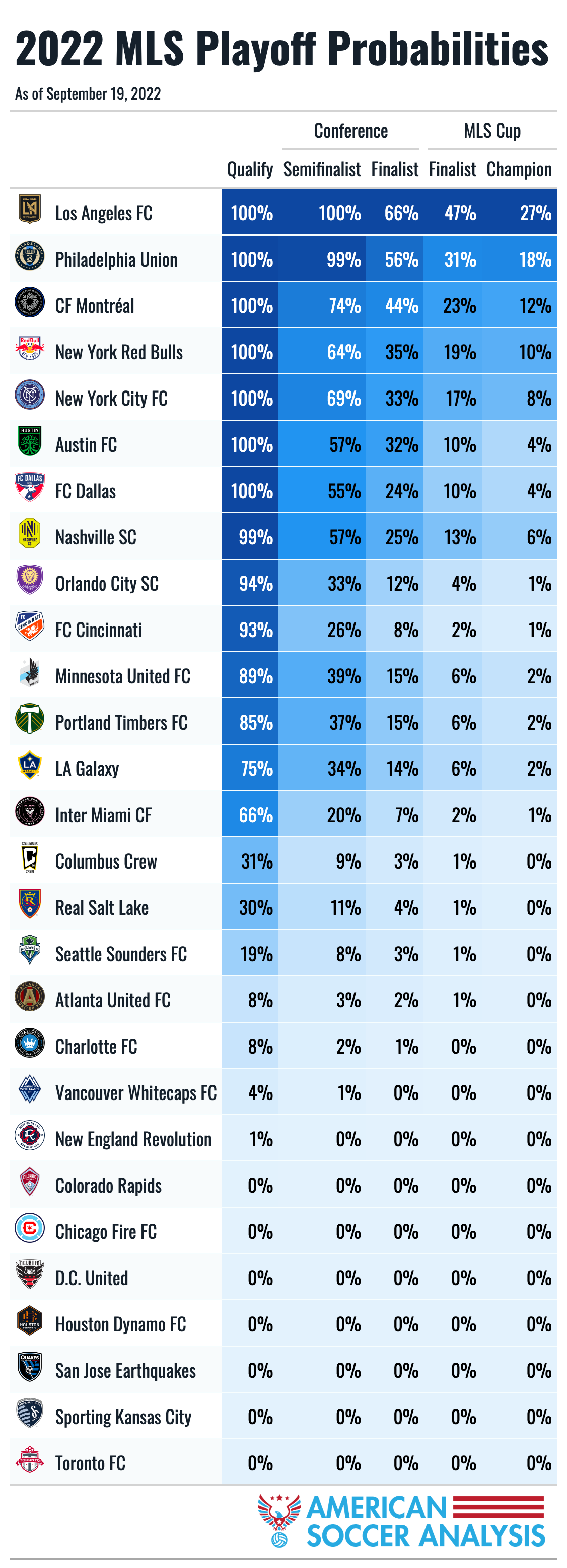MLS 2022 Playoff Projections
/By Sean Steffen
The MLS playoff season is fast approaching, and with 2-3 games left to go (depending on the team), we are now into the part of the season where the question of who is going make the playoffs is a desperate one for teams on the bubble. In the interest of fueling the existential dread of these fanbases, and, in keeping with the ASA tradition of releasing our playoff model projections whenever we get to them, we remembered that we should probably release those. So, without further ado, as I know half the readers will be gamblers wanting the good stuff up front, here are those projections.
The West
Out west, the LA Galaxy, Real Salt Lake, and Seattle Sounders are in a dog fight for the final playoff spot. By the standings, you can throw Vancouver in there as well, however, our model does not rate their chances. For those up in the Great White North wondering what this nonsense is all aboot, it’s worth noting that, in addition to having played one more game than the Galaxy and Sounders, the model also just doesn’t buy Vancouver this year. At the time of writing this, they have a -9.59 g+ differential, which is in the same ballpark as teams like Houston, who won’t be qualifying. They also have a tough home game against Austin FC, and an even tougher road game against Minnesota to close the season.
Between LA, RSL and Seattle, the model has the Galaxy in the driver’s seat. There are a number of reasons for this. For one, they are currently tied on points with RSL for that last playoff spot, with a game in hand on RSL, and a home game against them coming up (big playoff implications in that game). The Galaxy also boast the 5th best g+ differential in the league, whereas RSL is 9th and Seattle is 15th and in the negative range.
The Galaxy’s schedule, however, is not a cakewalk. While the model might give them decent probability to get points in their next game against a San Jose team that has the worst g+ differential in the league, it does not take into the account the history of the “Stanford Game” between these two teams, where San Jose plays the Galaxy once a year in a packed college football stadium—a venue that the Galaxy have only won in once. The Galaxy also finish the season with a visit to Houston, who have been playing incredible soccer lately under interim coach Kenny Bundy, arguably being the best team in all 3 games he's coached, including on the road against LAFC. There is also a history there, with Houston having knocked the Galaxy out of the playoffs the last time the Galaxy visited Houston to close out the season. Houston will want to do this again.
The East
Now we move to the East, where the table is much more congested around the playoff line. From a purely points perspective, the race is between Miami, Columbus, and Atlanta for that final playoff spot, with Miami and Columbus tied on points and games played, separated only by the tie-breaker, with Atlanta two points behind, and having played one more game.
In this race, the ASA model is putting its money on Miami, despite having a worse g+ differential (-5.9) than Columbus (-0.6). The reason here is the remaining schedule, with Miami playing Toronto on the road (winnable considering TFC’s struggles) followed by two games at home against Orlando and Montreal. Given that the home advantage in MLS is so large, it makes perfect sense why this would look favorable to the model, Despite this, TFC is a team with a lot of attacking quality, Montreal is perhaps the surprise team of the year, and Orlando is a rivalry game, so, in reality, this is perhaps a little closer than the model gives credit for.
Columbus next hosts Red Bull, and then closes out the season with road games in Charlotte and Orlando. If Columbus wants to win this race, they’ll likely have to get better results on the road than Miami gets at home, which the model is reasonably suggesting, probably won’t happen.
But the game isn’t played on a spreadsheet mate!
I’ll conclude by talking a bit about the race for the Cup itself, and why MLS playoffs are so fun / unfair. At this point in the season, there is little doubt who the two best teams are : LAFC and Philly. There is also little doubt that this would be the best MLS Cup final from a neutral perspective, given the talent of LAFC (despite falling off the pace a bit) and the blistering results of Philly’s, put 6 on them, offense. Despite this dominance, simulations show, as does history, that each team has better odds to not make the finals, than make it. That is to say, even with a level of domination of the field rarely seen in MLS due to the parity structure (although this is not the first time we’ve had super team separation in a year), the actual road to the cup is still one of intense chaos. Each game, in essence, is a roll of weighted dice, and, while the weight of these dice show considerable strength over the stretch of a season, when you bring it to a small sample situation that is the playoffs and play games with a forced winner, the “magic of the playoffs” starts to kick in.
In short, modeling stuff like this is very hard, and if any computer could tell you with 100% certainty what was going to happen in any given soccer match, the sport wouldn’t be any fun to watch. These models can also change very quickly with results, and teams who have only long-odds and a prayer today can suddenly find themselves much more in the thick of things, should a couple of matches go their way.


